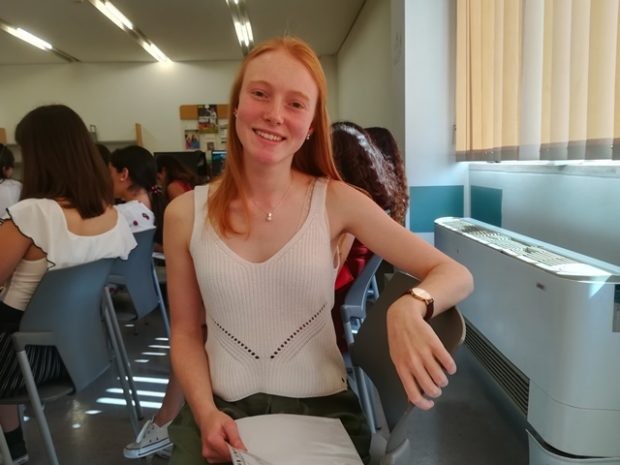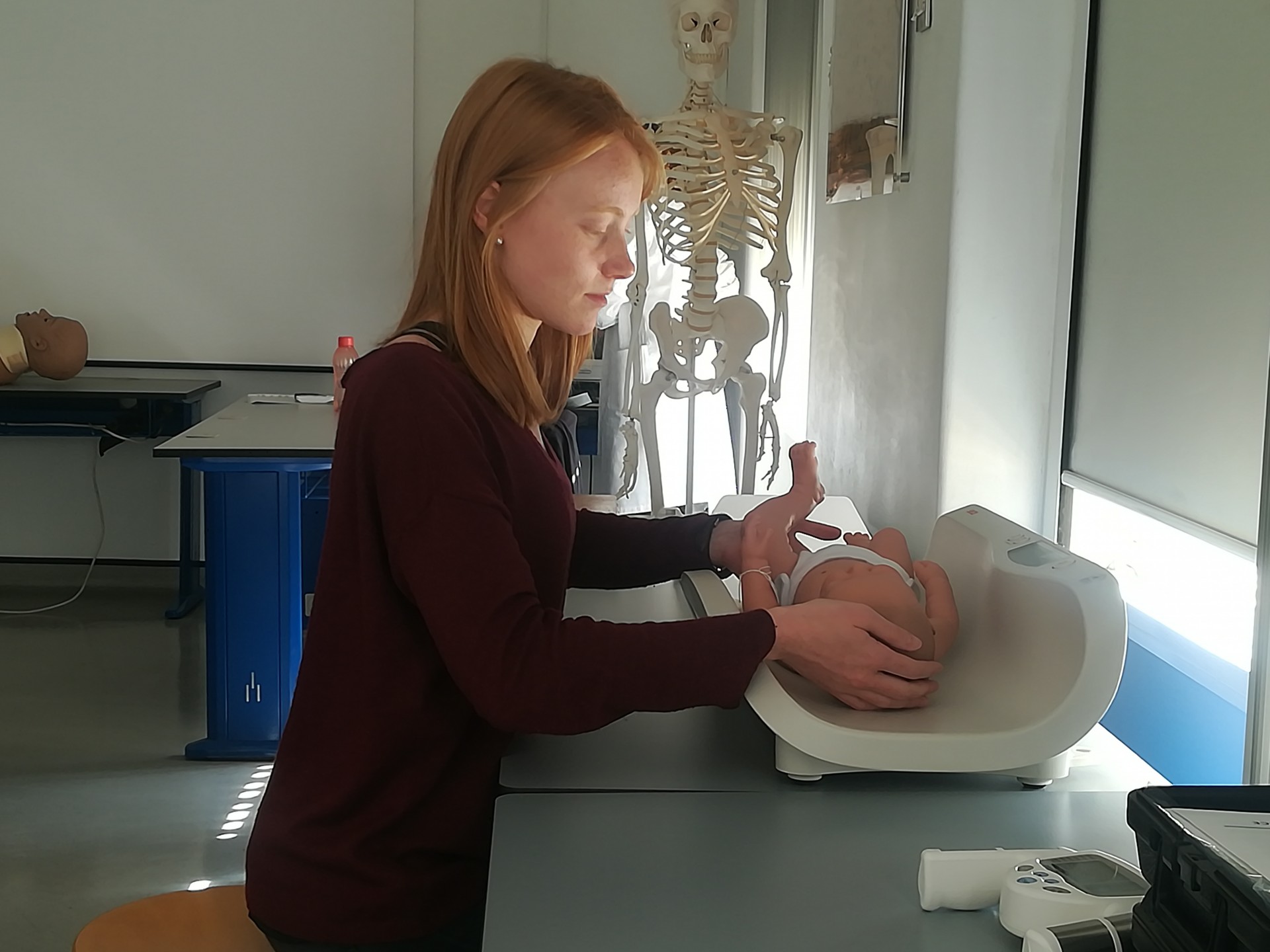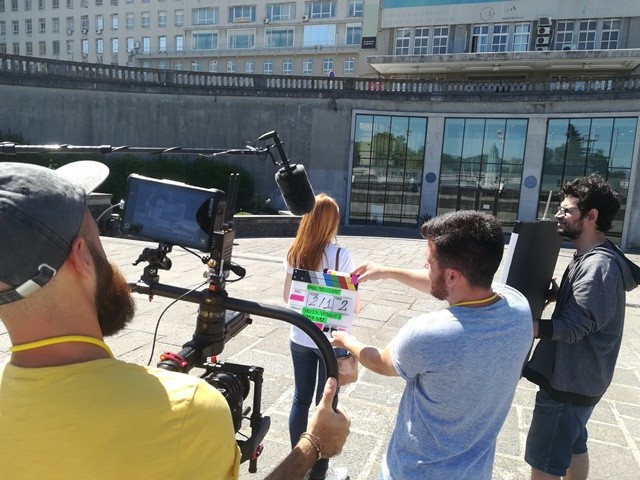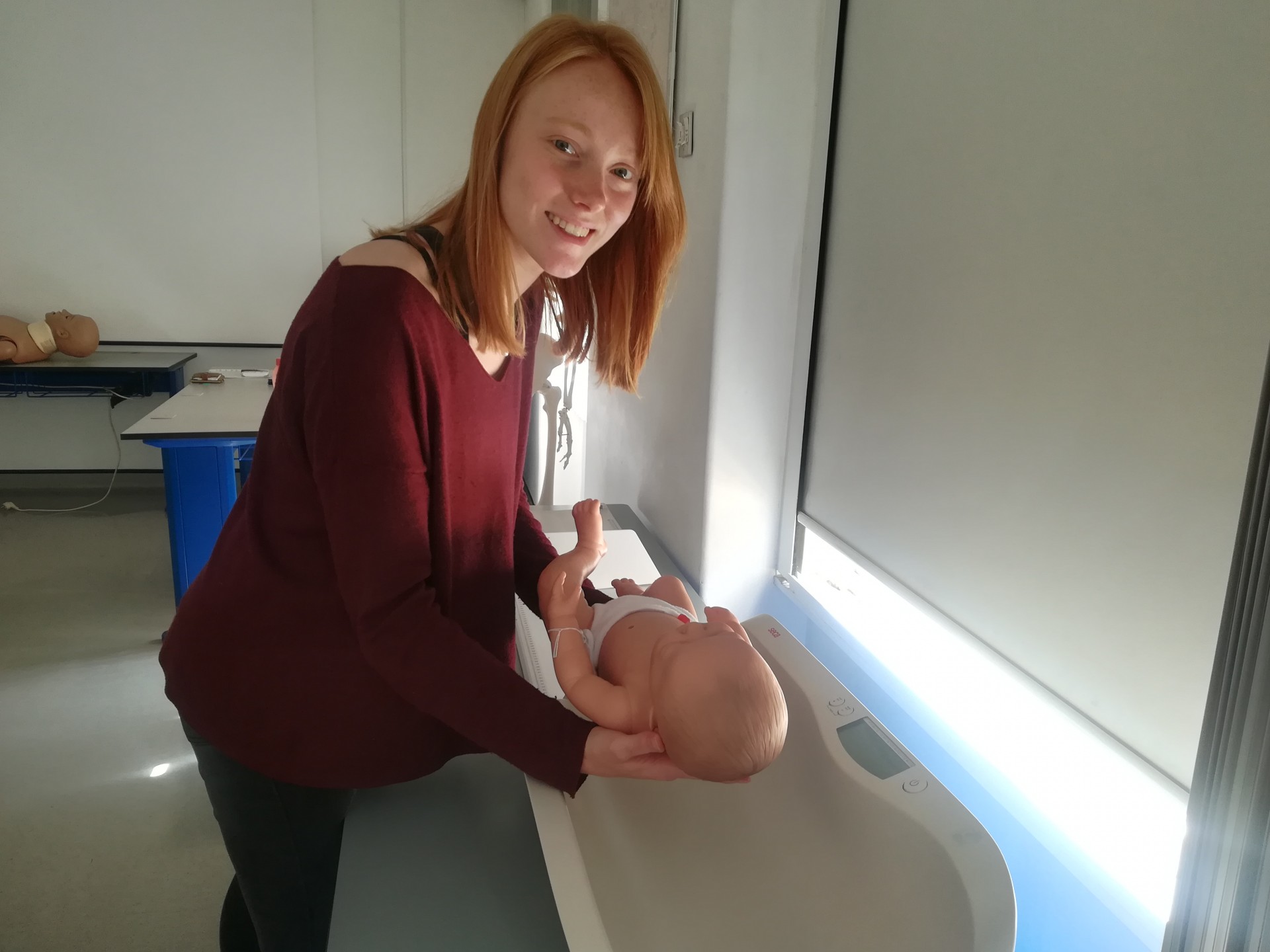
The first day we met Victoria she was sitting among dozens of students waiting for their turn to enrol in the Nutrition Sciences degree. The red hair and fine features caught the eye, but especially her calm, safe and discreet expression, showed that she would be of special interest.
Her surname is Stosberg, inherited from her father, a German born in Portugal. Victoria says she is half German, half Portuguese since her mother's nationality is 100% Portuguese. She and her two brothers followed the same educational methods as their father, always studying at the German School. With her paternal grandparents of German origins and school always fostering contact with Germany, Victoria knew that sooner or later there would be an opportunity to show that she was growing and building, even though she was a minor, her own path independently of her parents. The first step beyond her family boundaries was at 15 when she decided to go to Germany. She carried out an internship in a food and cosmetics quality control laboratory. For two weeks she learned what it was like to live alone in a country that was not her own, and despite her command of the language, direct contact with reality is always different from what she learned at school.
The connection to Germany would continue at a later stage to learn about part of Germany's history, which she described as a "heavy" experience, as she was confronted with various information about World War II. She managed to turn off the button of Germany from the past and return to today's Germany of modernity and opportunity, where one learns every rule with the utmost rigour. She undertook a new internship, this time in Bavaria, with a Neonatology Paediatrician. She stayed there another two weeks, observed everything, more than what she could, and realized that "being a doctor was not for her".

She returned to Portugal to take her degree. Prolonging her presence in Germany to take a degree did not cross her mind because she is the eldest of three siblings and it seemed logical to her that parents could not be overwhelmed by her student goals. Still, she will have and Erasmus+ mobility or take a master degree abroad.
A year 2 student of the Nutrition Sciences Degree, she also attends the course 'Turn the Kitchen into a Pharmacy', which alternates theoretical classes with Gabriel Mateus, holder of master degree in Clinical Nutrition, and practices with chef Diogo Noronha, demonstrating the influence of diet on health and as a disease prevention and treatment measure. She has particular respect for everything that involves food and its environmental impact, and while not being extremist about meat consumption, it advocates a more responsible and conscious sustainability on the part of humanity. She states that it is possible to taste great, non-animal foods by learning to change basic eating habits. But it's normal for Victoria to see things that way as she is a good cook and passionate about taste and looks at food almost as a cult and a sense of respect.
She began to learn how to make cakes, and when she became an expert, she moved on to savoury food and now definitely takes on other levels, also advocating vegetarian options.
One of the protagonists of the Faculty's institutional video, we decided to give equal focus to the Nutrition Sciences training to understand who is this pretty girl who everyone seems to have seen around.

It takes some courage to change countries, even for two weeks, when we're only 15.
Victoria: Yes it does! My parents took me there, I rented a house from a lady who was the mother of a person who worked in the cosmetics lab, she made a special price for me and I stayed. But right after that I was completely alone.
How was that first night in your new home?
Victoria: It was weird. I got home after work and didn't know what to do. I had a peek at the television and cooked. But then as the days went by, and as we were at the 2016 European Championship, Germany was going to play against another country. Then I decided to invite the lady who had rented me the house to watch the match with me. From then on we arranged to watch the matches together, at her place or mine. That's how time went by really fast, because I realized that I really liked that area of biochemistry I was learning in the lab.

In the second internship you came into contact with Paediatrics and that was when you ruled out being a doctor. Why was that?
Victoria: I felt that doctors do not have as much contact with patients as I expected. Who has the real contact, at least in that area of neonatology, where they care and treat, are the nurses. The doctor only went once a day and asked only questions, without having much contact or touch with the baby. I was disappointed, because after all I had created an image that was unreal.
That means you considered being a doctor. Why did you shift your focus elsewhere?
Victoria: Medicine was a very present idea because in my mother's family they are all doctors except my mother. But also my grades were not enough to enter the degree in Portugal and I really wanted to stay in my country. So I equated nursing, but quickly decided against it, because I have higher ambitions, I want to be independent in the labour market.
And that's when you come across this recently started degree.
Victoria: This degree came at the right time when I was looking for possible options. As soon as I saw this degree I thought, "This is it!". At first it struck my parents as they thought I would become a nutritionist in any business that would never allow me to grow for myself. But they realized that I have other ambitions and that there are other solutions.
How do you balance the fact that you are studying a degree in Nutrition Science that at the beginning is identical to the medical degree and combine it with a degree that argues that science is not always the first option for healing and that the answer may lie in the reformulation of ingested food?
Victoria: I believe that the origin of diseases is not exclusively genetic, it also comes from other environmental factors due to poor diet. It is a mix of factors that can be more or less triggered depending on the profile of each person. Now, of course, if we do not smoke, if we are physically active, if we eat a balanced and conscious diet, we have already contributed a lot to our health. I think that what is still missing is consciousness. I give an example, today I will eat a steak because I really feel like it, but I should not eat it every day and I choose to reduce the consumption of meat and increase the amount of vegetable intake in the following days. Only here there is a break-even point. Then the collective awareness is missing, meat production has much more environmental impact than pea consumption, for example. And lack of awareness refers to lack of knowledge. I take stock of this, but even for those who study it, it is a challenge, we have to obtain information every day and be critical.
You are still starting the 2nd year and more steps await you. But it seems to me that you have a professional project in mind when you graduate.
Victoria: I want to be independent, to have my business and be able to manage my career my way. I do not wish to be dependent on a hospital, institution, or clinic, perhaps having my own clinic, with other health professionals.
Your sense of freedom, independence, is curious, because in fact this is what you want to be in front of your own parents, not because you like them less, but because you want to manage your way, relieving others. Is it the result of a German education?
Victoria: I am very much like that. I work as a host at events, give maths tutoring every week, I baby sit. This is my way of saving and buying what I want, and avoid asking beyond my allowance.
I guess none of your parents told you they couldn't or did not want to help you.
Victoria: No one! When my mother sees me at work she asks if the problem is in the allowance and if it needs to be increased. But it is not. I want to try to be as independent as possible. This attitude of mine originates in my background. My grandfather is the typical stark German, he never gave anything to my father without him giving it its proper value, meaning he had to give something back. My father started working at 18, when he had just got his driving license, made deliveries for my grandfather who paid by the kilometre.
Has this extreme discipline been passed on to you?
Victoria: No, although my father grew up a lot with these rules, this marked him in some way. So he never did the same thing to us, he gives us everything, but always with the sense we have to earn and take responsibility for the challenges.

What awaits you in these next two years of the degree? Are you sure about the way?
Victoria: This 2nd year is getting more complicated at first, but it is normal and it will always be normal to increase the degree of difficulty. Still, the point is that I am involved in many things at once. I need to get into my time and learn how to manage it very well and I haven't done it fully yet. In order to start seriously, all the effort has to be put in it.
When you received the invitation to be part of the Faculty's institutional video, why did you accept it immediately?
Victoria: I thought "wow, they remembered me, maybe they liked me and they want me in that video". I realized they could have called 300 students x 6 years at least, and I was one of the chosen ones. So it was an opportunity I couldn't miss. I accepted it, even though I had this whole week of vacation scheduled, so I negotiated to record everything in one day, came in the morning, and returned in the afternoon. I think the video was spectacular and the team was extraordinary and very professional and objective, they guided me very well and I never felt bad or inhibited. I am proud of this final product!
****
Victoria has been contacted several times to join modelling agencies for advertising or photo shoots, but her father never allowed her. Not while his daughter was a minor. Over time, she decided she was unwilling to expose herself and today she does not regret her father's limitations. She is linked to her father and mother in a number of ways that one day may come together even more. A businessman in the non-food catering business, her father owns the business and her mother manages everything financially.
But there are other connections that explain her as a person. Her maternal grandfather was a doctor and her grandmother a nurse. Victoria has already lost both, but she recalls that at her grandfather's funeral almost all of Sever do Vouga's population came to honour the kindness of the doctor who had always been dedicated to helping everyone, even when they could not afford to be treated.
Altruism seems to be something that is inherited. In the little space that she still had on the agenda, she found a way to start volunteering at the Association of Friends of Santa Maria Hospital, making a commitment of 4 hours per week. In her notion of a world without borders, she understands that she is happy and lucky in life to have a family that has always protected and loved her. Now it is her turn to "give a little to others, either love or attention, because indeed it is an obligation that all mankind has".
Joana Sousa
Equipa Editorial

